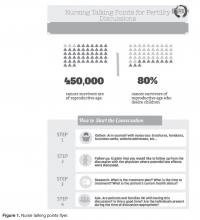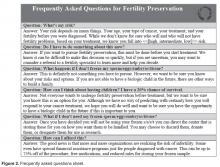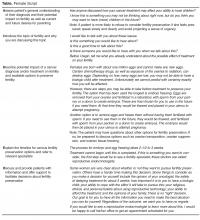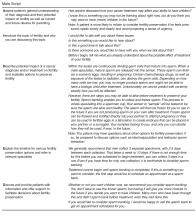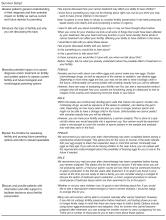Equipping nurses with content-specific communication may overcome some of the barriers described. A method often used in nursing education and communication interventions is scripting [16–18]. Scripting provides precise key words that ensure consistency in the message, no matter the messenger [19]. This paper reports on the development and refinement of a series of scripts to guide discussions about FP for male and female AYA patients and survivors.
Script Development
In 2003 Studer developed the AIDET (Acknowledge, Introduce, Duration, Explanation, and Thank you) model of communication for health professionals [19]. AIDET is an effective tool in facilitating communication practices among nurses and physicians in adult and pediatric settings [20–24]. The AIDET model was adapted by our team to develop AIDED: Assess, Introduce, Decide, Explain, and Discuss, a script-based approach to assist oncology nurses in fertility discussions with their AYA patients. Our team included experts in fertility and reproductive health, health education, health communication, as well as clinical and psychosocial care of AYA patients.
We developed 3 scripts. Two were targeted to AYA females and males at or near time of diagnosis (Female Script and Male Script) and one targeted to AYA survivors who had completed treatment (Survivor Script). Each script contained dialogue guidelines using the AIDED format. The scripts were accompanied by a flyer that provides a brief overview on how to start a discussion about FP ( Figure 1 ) and a frequently asked question (FAQ) sheet that addresses common questions regarding fertility risk, FP time lines, survivorship, and financial concerns ( Figure 2 ). The goal was to produce a packet of materials for future use in communication research and ultimately, dissemination into clinical practice.Educating Nurses
about Reproductive Issues in Cancer Healthcare (ENRICH) is a web-based communication skill building curriculum for oncology nurses to initiate reproductive health discussions with AYA patients [25]. Because these individuals are actively engaged in the care of AYA patients and familiar with the content and process of providing information about fertility and FP to AYA patients, we elicited feedback from this group to improve our scripts and other materials targeting AYA oncology nurses. Overall, the nurse reviewers found the scripts socially acceptable and appropriate. The problems identified included awkward or vague wording and poorly or undefined terminology. The team addressed these issues by replacing the awkward wording, clarifying or softening some language, and using more simplistic terms. The revised Female script is shown in the Table; the Male and Survivor scripts are presented at the end of this article.Benefits of Scripts
Communication difficulties may present an obstacle for oncology nurses to address the infertility, FP information, and supportive care needs of AYA cancer patients [15]. While guidelines from leading health and professional organizations support the need to discuss these issues with patients, implementation requires providing practical tools that meet the needs of nurses’ practice setting and patient population [26].
The use of scripts has a long history in the
medical profession and is growing in importance for “breaking bad news” and end of life discussions [27]. For clinicians, scripts provide networks of knowledge adapted to the goals of clinical tasks. Scripts also incorporate the notion of Hymes’ communication competence by demonstrating the underlying traits that enable speakers to be perceived as effective communicators: knowing what, how and when to say something [28]. Scripts provide structure to describe a medical sequence of events within the most appropriate context, such as discussing the risk of infertility from cancer treatment prior to the initiation of the treatment. Importantly, scripts are best used with communication skills training that incorporate empathy and listening skills [29–31].
